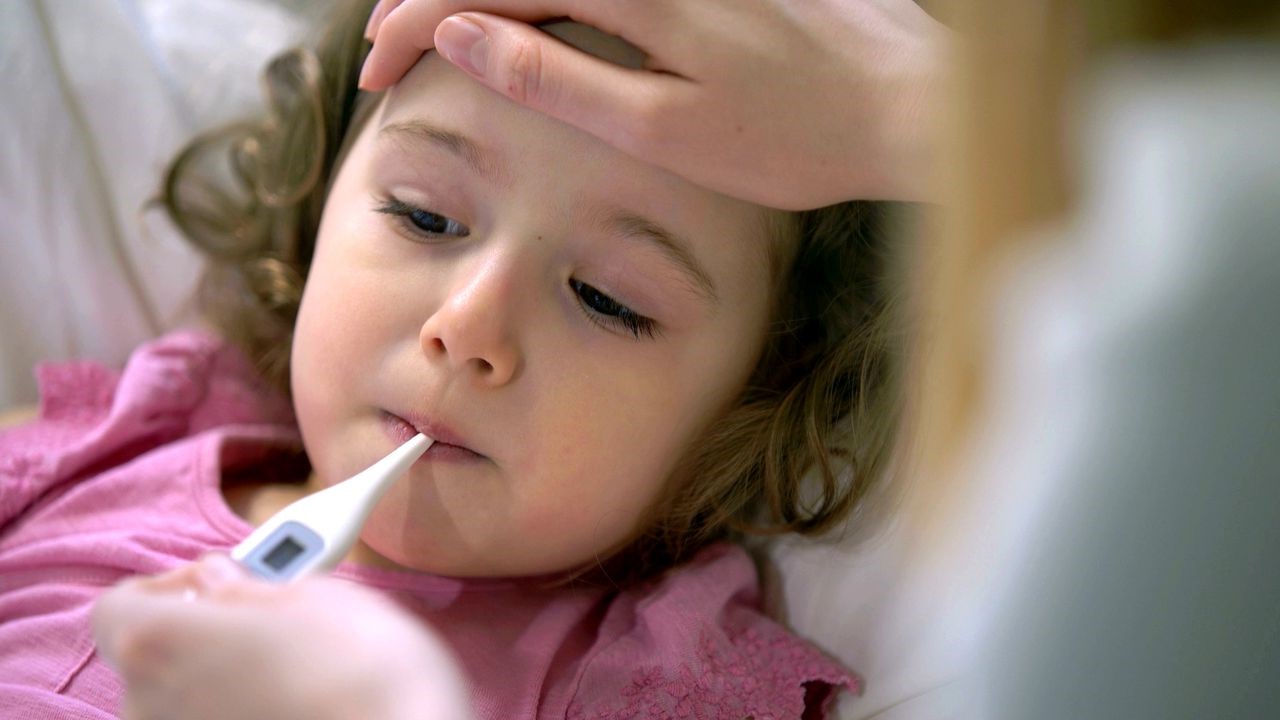Home>Health & Nutrition>Understanding And Managing Fever In Toddlers


Health & Nutrition
Understanding And Managing Fever In Toddlers
Modified: May 4, 2024
Learn how to understand and manage fever in toddlers with expert tips on health and nutrition. Keep your little one healthy and happy.
(Many of the links in this article redirect to a specific reviewed product. Your purchase of these products through affiliate links helps to generate commission for Temperatures.com, at no extra cost. Learn more)
Table of Contents
Introduction
Fever is a common concern for parents, especially when it affects their toddlers. It can be distressing to see a little one feeling unwell and running a high temperature. Understanding fever in toddlers is essential for parents and caregivers to effectively manage this common childhood ailment.
In this comprehensive guide, we will explore the causes, symptoms, and management of fever in toddlers. Additionally, we will discuss when to seek medical attention, home remedies, medications, and preventive measures to help parents navigate through this challenging aspect of their child's health.
Fever, often considered a natural defense mechanism, is the body's response to an infection or illness. While it can be alarming, especially when the temperature rises rapidly, it is important to remember that fever itself is not an illness but rather a sign of an underlying condition. By understanding the nature of fever and its implications for toddlers, parents can take appropriate steps to provide comfort and aid in their child's recovery.
As we delve into this topic, it's crucial to approach the management of fever in toddlers with a balanced perspective. While it's essential to address the symptoms and provide relief, it's equally important to be mindful of when medical intervention may be necessary. By gaining a deeper understanding of fever in toddlers, parents can feel more empowered to make informed decisions about their child's health.
Throughout this guide, we will provide valuable insights and practical tips to help parents navigate the challenges of managing fever in toddlers. By equipping caregivers with the knowledge and resources they need, we aim to alleviate some of the anxiety and uncertainty that often accompany this common childhood experience.
Causes of Fever in Toddlers
Fever in toddlers can be attributed to various factors, with infections being the most common cause. Understanding the underlying reasons for a toddler's fever is crucial for effective management. Here are the primary causes of fever in toddlers:
-
Viral Infections: Viruses are a leading cause of fever in toddlers. Common viral infections such as the flu, colds, and respiratory syncytial virus (RSV) can result in elevated body temperature. These infections often manifest with additional symptoms such as coughing, congestion, and sore throat.
-
Bacterial Infections: Bacterial infections, including strep throat, urinary tract infections, and certain types of pneumonia, can trigger fever in toddlers. These infections may require medical intervention, including antibiotic treatment.
-
Ear Infections: Toddlers are prone to ear infections, which can cause fever and discomfort. The inflammation and buildup of fluid in the middle ear can lead to a rise in body temperature.
-
Teething: The process of teething, during which a toddler's primary teeth emerge, can also lead to a slight increase in body temperature. While teething-related fevers are generally low-grade, they can cause distress for the child.
-
Immunizations: Following routine vaccinations, toddlers may experience a mild fever as a normal immune response to the vaccine components. This typically occurs within a few days of receiving the immunization and is often accompanied by other mild symptoms.
-
Environmental Factors: Exposure to extreme temperatures or overdressing can lead to a fever in toddlers. It's important to ensure that a toddler is dressed appropriately for the prevailing weather conditions to prevent overheating.
-
Other Causes: Less commonly, fever in toddlers can be attributed to conditions such as inflammatory disorders, autoimmune diseases, or certain medications.
Understanding the potential causes of fever in toddlers enables parents and caregivers to assess the situation more effectively. By recognizing the underlying factors contributing to a toddler's fever, appropriate measures can be taken to address the root cause and provide the necessary care and comfort.
Symptoms of Fever in Toddlers
When a toddler develops a fever, it often presents with a range of accompanying symptoms that can provide valuable insights into their overall condition. Understanding these symptoms is essential for parents and caregivers to effectively assess and manage their child's fever. Here are the common symptoms of fever in toddlers:
-
Elevated Body Temperature: The hallmark symptom of fever is an elevated body temperature. In toddlers, a fever is generally defined as a rectal temperature of 100.4°F (38°C) or higher. While a fever itself is not an illness, it indicates that the body is responding to an underlying infection or other triggering factors.
-
Irritability and Restlessness: Toddlers with fever may exhibit increased irritability and restlessness. They may appear fussier than usual and have difficulty settling down, which can be attributed to their discomfort and the overall impact of feeling unwell.
-
Decreased Appetite: Fever in toddlers can lead to a decreased appetite. They may show reluctance to eat or drink, which can be concerning for parents. It's important to encourage fluid intake to prevent dehydration, even if the toddler's appetite is diminished.
-
Lethargy and Fatigue: Fever can cause toddlers to feel lethargic and fatigued. They may seem less active and energetic than usual, preferring to rest or engage in quiet activities. This is the body's way of conserving energy to combat the underlying cause of the fever.
-
Flushed Skin: A toddler with a fever may have flushed or warm skin. This can be noticeable on their cheeks and forehead. The skin may feel warm to the touch, indicating the body's efforts to regulate its temperature.
-
Chills and Shivering: While a fever often leads to a sensation of warmth, toddlers may also experience chills and shivering as their body attempts to adjust to the elevated temperature. This alternating sensation of feeling hot and cold can be distressing for the child.
-
Cough, Runny Nose, or Sore Throat: Depending on the underlying cause of the fever, toddlers may exhibit symptoms such as a cough, runny nose, or sore throat. These accompanying symptoms can provide clues about the nature of the infection or illness contributing to the fever.
-
Difficulty Sleeping: Fever can disrupt a toddler's sleep patterns, leading to difficulty in falling asleep or staying asleep. This can further contribute to their overall irritability and fatigue.
By recognizing these symptoms, parents and caregivers can gain valuable insights into a toddler's condition and provide appropriate care and comfort. It's important to monitor the child's symptoms closely and seek medical advice if the fever persists or if additional concerning symptoms develop.
When to Seek Medical Attention
While fever in toddlers is often a common and manageable occurrence, there are certain circumstances that warrant prompt medical attention. Recognizing when to seek medical help is crucial for ensuring the well-being of the child. Here are the key indicators that signify the need to consult a healthcare professional:
-
High Fever: If a toddler's fever is persistently high, reaching 103°F (39.4°C) or higher, it is advisable to seek medical attention. High fevers can be indicative of a more serious underlying infection or condition that requires evaluation by a healthcare provider.
-
Duration of Fever: If a toddler's fever persists for more than a couple of days without showing signs of improvement, it is important to consult a healthcare professional. Prolonged fevers may indicate a more complex or lingering illness that requires medical assessment and appropriate treatment.
-
Unusual Symptoms: If a toddler exhibits unusual or concerning symptoms alongside the fever, such as difficulty breathing, severe lethargy, persistent vomiting, or a rash, it is essential to seek medical attention promptly. These symptoms may indicate a more serious underlying condition that requires medical evaluation.
-
Underlying Health Conditions: For toddlers with pre-existing health conditions or compromised immune systems, it is important to seek medical advice promptly when they develop a fever. Children with chronic illnesses or immune system disorders may be more susceptible to complications from infections, necessitating early medical intervention.
-
Age and Behavior: For infants under three months of age, any instance of fever should prompt immediate medical attention. Additionally, if a toddler's behavior is markedly different from their usual demeanor, such as extreme irritability, persistent crying, or difficulty in waking, it is advisable to seek medical evaluation.
-
Parental Concerns: Trusting parental instincts is crucial. If parents or caregivers are deeply concerned about a toddler's fever, even if it does not align with specific medical guidelines, seeking medical advice can provide reassurance and ensure that any potential issues are addressed promptly.
In summary, while many fevers in toddlers can be managed at home with appropriate care and monitoring, certain circumstances necessitate medical attention. It is important for parents and caregivers to be vigilant in observing the child's symptoms and to seek medical advice when necessary. Prompt medical attention can help identify and address any underlying health concerns, providing the best possible care for the toddler's well-being.
Home Remedies for Managing Fever
When a toddler develops a fever, parents and caregivers often seek ways to alleviate their discomfort and promote recovery. While medical intervention may be necessary in certain cases, there are several home remedies that can help manage a toddler's fever and provide comfort during this challenging time.
1. Maintain Hydration
Encouraging the toddler to drink plenty of fluids is essential for preventing dehydration, especially when their appetite is diminished. Offer water, clear broths, diluted fruit juices, or oral rehydration solutions at regular intervals to ensure adequate hydration.
2. Lukewarm Bath
A lukewarm bath can help lower a toddler's body temperature and provide relief from fever-induced discomfort. Avoid using cold water, as it can cause shivering and potentially raise the body's temperature. Gently sponge the child with lukewarm water to help cool their body.
3. Comfortable Clothing and Environment
Dress the toddler in lightweight, breathable clothing to prevent overheating. Maintain a comfortable room temperature to promote relaxation and aid in regulating the child's body temperature.
4. Rest and Comfort
Ensure that the toddler gets plenty of rest to support their body's healing process. Create a calm and soothing environment to help the child relax and recuperate.
5. Use of Cooling Pads
Applying a cool, damp cloth to the toddler's forehead or the back of the neck can provide temporary relief from fever. Avoid using ice packs or very cold water, as they can be too intense for a young child's skin.
6. Herbal Teas
Certain herbal teas, such as chamomile or peppermint, can help promote relaxation and provide a soothing effect. Offer these teas in small amounts, ensuring that they are at an appropriate temperature for the child.
7. Monitor and Comfort
Regularly monitor the toddler's temperature and provide comfort as needed. Offer reassurance and gentle care to help the child feel secure and supported during their recovery.
These home remedies can complement medical guidance and play a supportive role in managing a toddler's fever. It's important to remember that these remedies are intended to provide comfort and support, and medical advice should be sought if the fever persists or if additional concerning symptoms develop.
By implementing these home remedies with care and attentiveness, parents and caregivers can help ease a toddler's discomfort and contribute to their overall well-being during episodes of fever.
Medications for Fever in Toddlers
When it comes to managing fever in toddlers, medications can play a crucial role in providing relief and aiding the child's recovery. It's important for parents and caregivers to approach the use of medications with careful consideration and under the guidance of a healthcare professional. Here are the key points to understand about medications for fever in toddlers:
Read more: Understanding The Symptoms Of Fever
Acetaminophen and Ibuprofen
Acetaminophen and ibuprofen are commonly recommended medications for reducing fever and alleviating discomfort in toddlers. These medications are available in various forms, including liquid suspensions, and are administered based on the child's weight and age. It's essential to follow the dosing instructions provided by the healthcare provider or the medication packaging to ensure the child receives the appropriate amount.
Dosing Considerations
When administering medications to reduce fever in toddlers, it's crucial to adhere to the recommended dosages based on the child's weight and age. Caregivers should use a calibrated measuring device, such as an oral syringe or dosing cup, to accurately measure the medication. Avoid using household spoons, as they may not provide the precise dosage and can lead to errors in administration.
Alternating Between Medications
In some cases, healthcare providers may recommend alternating between acetaminophen and ibuprofen to manage a toddler's fever effectively. This approach involves administering one medication, followed by the other after a specified duration, as directed by the healthcare professional. Caregivers should strictly adhere to the prescribed dosing schedule and avoid overlapping or exceeding the recommended dosages.
Consultation with Healthcare Providers
Before administering any medication to a toddler, it's imperative to consult with a healthcare provider. They can provide personalized guidance based on the child's medical history, current health status, and any existing conditions. Healthcare professionals can also offer specific recommendations for managing fever in toddlers, taking into account individual factors and potential interactions with other medications.
Read more: Understanding Fever: Causes And Symptoms
Importance of Monitoring
While medications can help reduce fever and alleviate discomfort, it's essential to closely monitor the toddler's response to the treatment. Regularly checking the child's temperature and observing their overall condition is crucial. If the fever persists or if the child's symptoms worsen, prompt medical attention should be sought to ensure appropriate evaluation and further management.
By understanding the role of medications in managing fever in toddlers and approaching their use with diligence and caution, parents and caregivers can contribute to the child's comfort and well-being during episodes of fever. It's important to prioritize the child's safety and seek professional guidance to ensure the appropriate use of medications for fever management in toddlers.
Preventing Fever in Toddlers
Preventing fever in toddlers involves implementing proactive measures to minimize the risk of infections and other factors that can lead to elevated body temperature. While it may not be possible to completely eliminate the occurrence of fever, especially in young children who are prone to infections, certain strategies can help reduce the likelihood of fever episodes. Here are key practices for preventing fever in toddlers:
1. Vaccination
Ensuring that toddlers receive recommended vaccinations according to the immunization schedule is crucial for preventing various infectious diseases. Vaccines provide protection against common viral and bacterial infections, reducing the risk of fever and related complications.
2. Hand Hygiene
Promoting good hand hygiene practices among toddlers and caregivers is essential for preventing the spread of infections. Regular handwashing with soap and water, especially before meals and after using the restroom, can significantly reduce the transmission of germs that can cause fever-inducing illnesses.
3. Environmental Hygiene
Maintaining a clean and hygienic environment in the home and daycare settings can help minimize exposure to pathogens. Regular cleaning and disinfection of frequently-touched surfaces, toys, and play areas can contribute to a healthier environment for toddlers, reducing the risk of infections that may lead to fever.
4. Proper Nutrition
Providing toddlers with a balanced and nutritious diet supports their immune system, making them more resilient to infections. A diet rich in fruits, vegetables, lean proteins, and whole grains can help bolster the child's overall health, reducing the susceptibility to illnesses that can trigger fever.
5. Adequate Rest and Sleep
Ensuring that toddlers receive sufficient rest and quality sleep is vital for maintaining their immune function. A well-rested child is better equipped to fend off infections, reducing the likelihood of developing fever due to common illnesses.
6. Temperature Regulation
Taking measures to regulate the toddler's body temperature, such as dressing them appropriately for the prevailing weather conditions and avoiding extreme temperature fluctuations, can help prevent overheating or chilling, which may contribute to fever episodes.
7. Avoiding Exposure to Sick Individuals
Minimizing the toddler's exposure to individuals who are ill, especially those with contagious conditions such as colds, flu, or other infections, can reduce the risk of contracting fever-inducing illnesses.
By incorporating these preventive measures into the daily care and routines of toddlers, parents and caregivers can take proactive steps to reduce the occurrence of fever and promote the overall well-being of young children. While it may not be possible to completely eliminate the risk of fever, these strategies can significantly contribute to minimizing its frequency and impact on toddlers' health.
Conclusion
In conclusion, understanding and managing fever in toddlers is a vital aspect of parenting and caregiving. Fever, while often a natural response to infections and other triggers, can be distressing for both the child and the caregivers. By gaining insights into the causes, symptoms, and management of fever in toddlers, parents and caregivers can navigate this common childhood ailment with greater confidence and effectiveness.
Recognizing the various causes of fever in toddlers, including viral and bacterial infections, teething, and environmental factors, empowers caregivers to assess the situation more effectively. Understanding the symptoms of fever, such as elevated body temperature, irritability, and decreased appetite, provides valuable cues for addressing the child's discomfort and seeking appropriate care.
Knowing when to seek medical attention is crucial for ensuring the well-being of toddlers experiencing fever. High fever, prolonged duration of fever, unusual symptoms, and underlying health conditions are key indicators that necessitate prompt medical evaluation. Trusting parental instincts and seeking medical advice when concerned are essential practices in safeguarding a toddler's health.
Home remedies, including maintaining hydration, providing a comfortable environment, and using cooling measures, can offer supportive care for toddlers with fever. Additionally, the cautious use of medications, under the guidance of healthcare professionals, can help alleviate discomfort and reduce fever.
Preventive measures, such as vaccination, hand hygiene, proper nutrition, and adequate rest, play a proactive role in minimizing the risk of fever in toddlers. By incorporating these strategies into daily routines, caregivers can contribute to the overall health and well-being of young children.
In essence, by equipping parents and caregivers with the knowledge and resources needed to understand and manage fever in toddlers, this guide aims to alleviate some of the anxiety and uncertainty that often accompany this common childhood experience. With a balanced approach that combines vigilance, supportive care, and timely medical intervention when necessary, caregivers can navigate the challenges of fever in toddlers with greater confidence and effectiveness, ultimately promoting the health and comfort of the little ones in their care.









